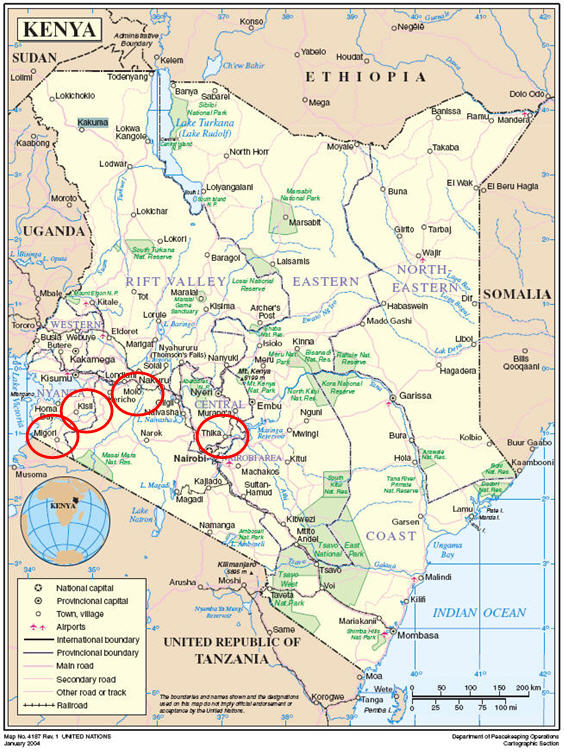Kenyan Girls LifeNets Scholarship Program
Back On Track!
|
Kenya LifeNets |
Update: February 22, 2008
By Rose McDowell
LifeNets Kenya Girls Scholarship Program for 2008 successfully began February 19 after several weeks of uncertainty. Nine sponsored girls are now attending secondary boarding schools in various locations. Because of post-election crisis conditions, LifeNets’ first group scholarship program was in doubt as tribal violence created dangerous conditions, which brought schools and businesses to a standstill. While started as political conflict, Kenyan news sources state that the underlying reason for the violence is the poverty that blights the majority of the population.
.
As we watched the post-election violence rapidly unfold in Kenya, we began to realize that our girls’ education project was unraveling before our eyes! We felt deep sadness for the senseless destruction and brutal killings, which gripped the very areas of Kenya where most of our young girls lived. Thankfully, they, along with their families, are safe and suffered no personal harm. A general cautious calm has settled over the country as international negotiators seek to work with Kenyan political forces for a workable solution. It is in this delicate peace setting that schools are opening over a month late.
We adjusted our plans. Because of tribal aspects in this massive conflict, safety concerns determined that the girls attend schools in their tribal areas near their families. This meant the Kenyan United Church of God deacons had to assist the girls in quickly finding quality secondary schools in their areas. Boarding secondary (9-12 grades) schools are best for girls in Kenya so we had planned for them to attend two schools, which meant they would be together in two groups. Our revised plan has several girls attending school alone, but they do have family nearby.
With an age range from 14 to 22, two young women (20 and 22) require only two years each to complete their secondary schooling. The remaining seven girls, ages 14-15 with one 17 year old, are starting in the 9th grade. Two girls are orphans living with relatives; two live with their widowed mothers; the remaining five live with their parents and siblings. They all come from large poor families where any available money is spent educating the sons according to African custom. Without the LifeNets Developing Nations Scholarship Program, these girls would have no hope of continuing their education, which offers them the opportunity to escape their poverty conditions.
Most of the girls live in the Western Rift Valley region of Kenya. Several will be attending schools in Migori, a trading town in the southwest corner of Kenya near the Tanzania border to the south and Lake Victoria to the west. Traveling north from Migori are several other towns where girls will be attending boarding schools including Kisii, Bomet, Molo and Siaya. This area is known for its agriculture including vast tea plantations. Kenya is the world’s largest tea producer.
Two sisters will be attending school in Saba Saba near Thika, in the Central Rift Valley northeast of Nairobi, Kenya’s capital. Mainly an agricultural area, major crops include tea, coffee, maize, beans and bananas. While this area has rich farmland, it does not translate into economic success for the local people.
This summer Rose McDowell and Judy Servidio plan to travel to Kenya to visit the girls and their families. The girls will be in school during this time providing the opportunity to visit the schools and assess the girls’ progress and needs.
Below you can see the areas where girls are beginning to attend school as of February 19, 2008.
